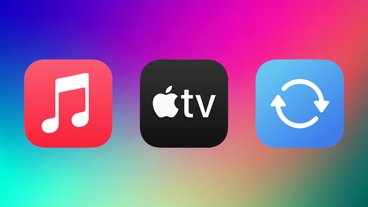Amazon, Apple, LG launch new app stores, Google Chrome Web Store dries up
It's been nearly three years since Apple opened its original iPhone App Store to resounding success. Since then, the company has constantly refined its App Store policies and practices in anticipation or reaction of users' and developers' expectations, expanding to include iPad apps last year, and tomorrow extending to Mac apps.
Every other smartphone platform has worked diligently to copy Apple's success, in many cases radically revamping their existing stores to pattern them after Apple's. Nokia's Ovi market for Symbian devices, BlackBerry's App World, and Google's Android Market have worked hard to copy the App Store, but without nearly as much success.
Palm and Microsoft were both induced to scuttle their existing mobile platforms and create entirely new ones with app stores closely modeled after Apple's, the Palm webOS and new Windows Phone 7 app stores), while new platforms, including Samsung's Bada, have similarly opened new mobile software markets.
Attracting enough attention from both developers and users to all of these new stores is difficult. While every store offers the basics like Twitter and Facebook and a handful of the most popular games, in order to stand out, new app stores need to deliver fresh apps on a regular basis. Doing this at the same rate as Apple is proving to be a tremendous challenge for vendors of new and revamped mobile platforms.
An Amazon app store for Android
One of the biggest problems for Google's Android platform is that there's no great app store; there are several options, with Google's own Android Market being the most prominent.
However, developers— including DoubleTwist, which serves as Android's biggest supporter in terms of making Android apps easy to use and buy— are critical of Google's hands off approach, noting that Android Market is overrun with intellectual property ripoffs and fake junk posing as legitimate apps. Malware is also a problem, not just for the official store but also for alternative Android apps stores.
Amazon hopes to solve this problem by taking over Google's role as the main retailer of Android's apps. The company's new Amazon app market, scheduled to open sometime "later this year," will attempt to be closer to Apple's App Store experience, offering a curated experience that hopes to prevent the Android catalog from being lost in a sea of knockoff junkware.
Amazon's fire sale policy
Amazon's retail prowess certainly positions it as one of the best hopes for a good Android app store. However, Android is adding some of its own quirks into its new store model. That includes reserving the right to deeply discount developer's titles at its own whim, part of Amazon's developer agreement in sections 5.g and 5.i.
The company will allow developers to set a list price, which Amazon will then slash as it deems necessary to drive sales. As with Apple's App Store, Amazon's developers will get a similar 70 percent share of the proceeds, although in Amazon's store, those proceeds may only amount to 20 percent of the list price if Amazon chooses to put their apps in its bargain bin. Apple allows developers to set and change their own app prices as they wish.
Amazon's "we will price your apps" approach may drive sales volumes, but it also opens up a new can of worms for some developers. While neither Google nor Amazon demand that the apps they carry be exclusive to their app stores, Amazon's developer agreement section 3.a stipulates that developers must make available to Amazon all the apps they sell on any other market (including Google's Android Market or third party market).
However, other markets stipulate that developers can't list their apps on other stores for cheaper. Because Amazon is taking price control and store listing choice away from developers, they're now stuck in a conundrum of being unable to sell their apps across multiple stores without running afoul of the rules of each.
On page 2 of 3: Google welcomes Android competition, Software theft and ad business model collapse
Google seems to be welcoming of the expansion of Android app stores, as Google's business model for Android is dependent upon search and ad revenues rather than app sales. In a comment published by TechCrunch, Google stated, "Android is an open platform – and entities other than Google are free to create their own content and marketplaces, much like the web."
However, if Google cedes app store control to a third party like Amazon, particularly a retailer who benefits from app sales rather than supporting Google's ad-supported model, its interest in Android could wane as developers primarily seek to sell ad-free apps in the model of Apple's App Store, leaving Google with increasingly less ad revenue.
Google has promoted ad-supported apps in its Android Market to the point where Angry Birds developer Rovio described the practice as "the Google Way," and has subsequently only offered an ad-supported version of its popular game for Android.
Software theft and ad business model collapse
With a retailer like Amazon in the picture, Rovio might consider selling titles like Angry Birds for sale, if Amazon's apps are distributed with sufficient DRM to prevent widespread theft; if they aren't, the availability of non-ad supported, but easy to pirate, Android apps from Amazon may destroy Android's already weak software market.
Even worse, if Microsoft, Yahoo and other search providers effectively replace Google search on Android through apps sold by other retailers like Amazon, Google will find itself maintaining a platform it benefits very little from.
Amazon's entry into the Android app sales business joins Verizon and other carriers, who are already selling Android apps. With the freedom to buy apps from multiple places, Android users will also gain some complication in how apps are updated and installed. To use the Amazon store, users will need to configure some settings and load a special app that facilities app installation. After buying apps from multiple sources, users will also need to manage updates through each of those different stores.
How will the Mac App Store work out?
That's closer to Apple's new Mac App Store, which unlike its iOS equivalent, isn't going to be the only way to obtain Mac apps. In fact, Amazon may eventually begin selling Mac apps within its own store alongside Android, much as it has entered into the ebooks market, selling titles in parallel with Apple's iBooks and Google's new Books market.
That has the potential to bring the same concerns about widespread unauthorized copying of software from Android to Mac software, quenching developers' financial interests in supporting those platforms. Microsoft's Windows Phone 7 platform recently had its DRM system cracked, resulting in making it as easy to obtain new apps without paying for them as it is on Android, and subsequently similarly weakening the ability of developers to justify investment in the platform.
On page 3 of 3: Thinking outside the smartphone If we build it, will they come?
In addition to Android apps, third parties are also announcing new app stores for their other devices. Samsung already operates an app store for its own new Bada platform, and also supports Java and Windows Mobile phones, as well as Android models. It doesn't appear to have a functional store for all the smartphone platforms it sells yet, but that hasn't stopped it from expanding to other devices. The company already supports apps on some models of TVs, Blu-Ray players and home theater products it sells.
LG has also thrown its hat into the ring at this year's CES, offering TV and Blu-Ray player apps of its own along with a new set top box called the Smart TV Upgrader, an HDMI connected box that runs video service apps such as Vudu, CinemaNow and Netflix along with games and web-access apps.
LG's new Upgrader competes in a sense against Apple TV, although Apple still hasn't revealed App Store support for its new iOS-based TV box. Instead, Apple has only bundled built-in support for a limited number of third party services, including Netflix and Flickr, next to its own iTunes TV and movie rentals, podcasts, music and Mobile Me photo and video sharing features.
If we build it, will they come?
Simply opening a storefront of some kind, even one patterned after Apple's successful iTunes model, isn't guaranteed to result in success. Google launched its Chrome Web Store last month for web-based apps that can run within the company's own browser or on its forthcoming Chrome OS, which is intended to power a new range of netbooks and other thin client devices later this summer. The new store is closely modeled after the look and layout of Apple's iTunes (below).
However, a report by TechCrunch notes that "unfortunately, as far as we can tell, nobody is really buying anything on it." The site pointed out that some titles are only seeing a half dozen downloads a week, and "few of the other applications in the list are doing better, but even those are still showing lackluster sales."
The report concluded, "one thing is clear: Google has a long way to go with the Web Store. It’s still impossible to distinguish applications that are basically just bookmarks from those that are full-fledged web apps. And while the purchase flow itself is pretty simple (you can buy something in a couple clicks, assuming you already have a Google Checkout account), I think Google will have to put some work into educating people on what exactly they’re paying for."
Apple has similarly seen only marginal interest in its free Safari Extensions program, but the company didn't position the browser extension site as a store, and has done little to promote it. Safari's Extensions, like Google's Chrome Web Apps, are also segregated away into the browser itself, rather than being connected to the companies' online app stores.
Apple's Mac App Store, which opens tomorrow, is similarly a standalone app, although Apple will apparently be distributing it as a software update along with an updated build of Mac OS X 10.6.6.
 Daniel Eran Dilger
Daniel Eran Dilger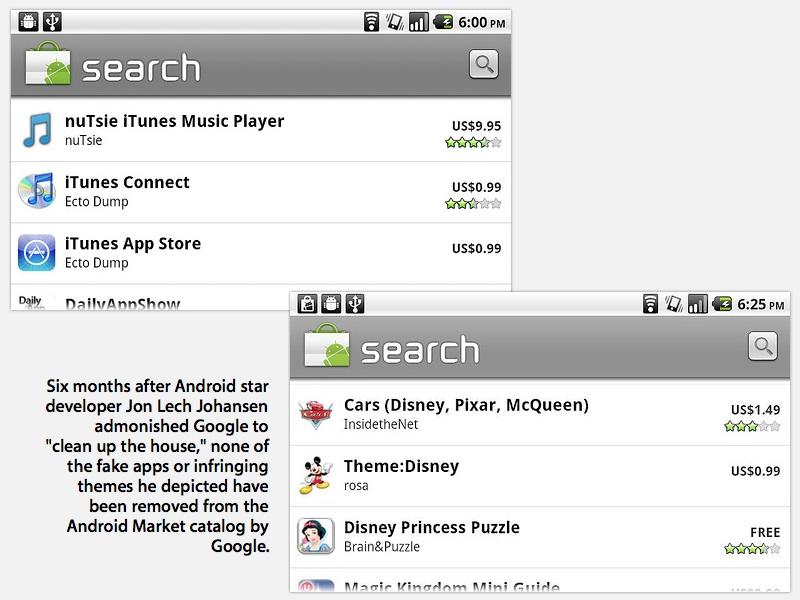
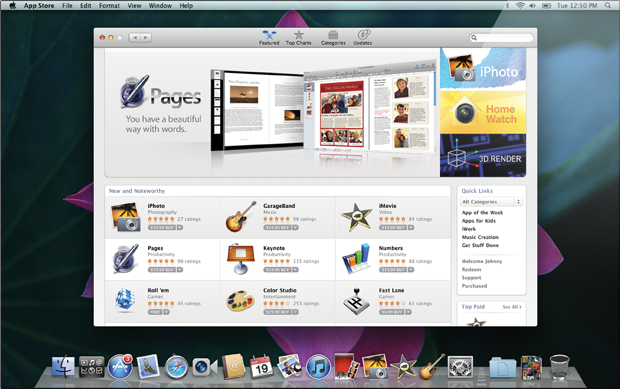
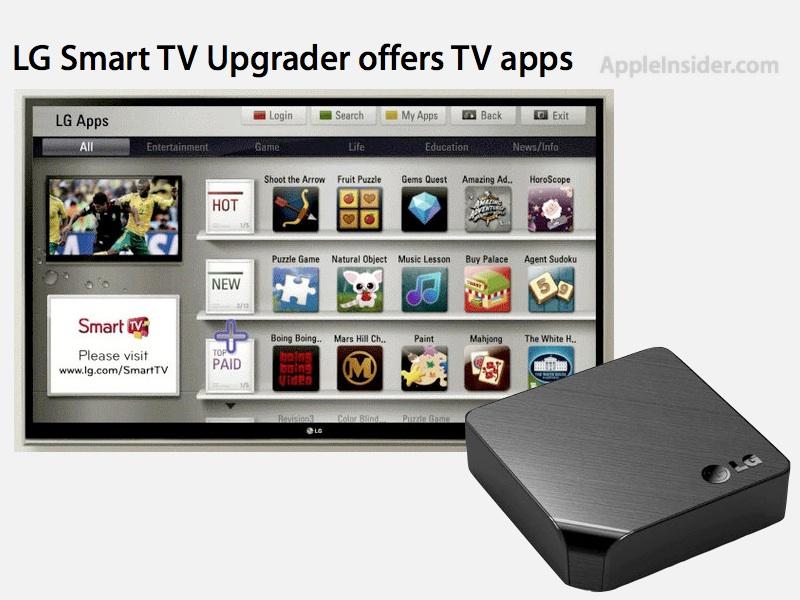
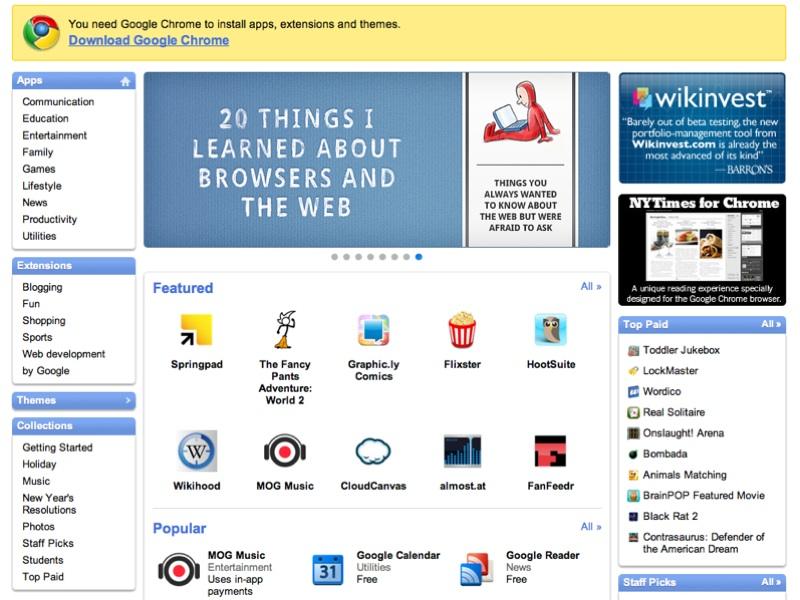











 Chip Loder
Chip Loder
 Andrew Orr
Andrew Orr
 Marko Zivkovic
Marko Zivkovic
 David Schloss
David Schloss

 Malcolm Owen
Malcolm Owen

 William Gallagher
William Gallagher

